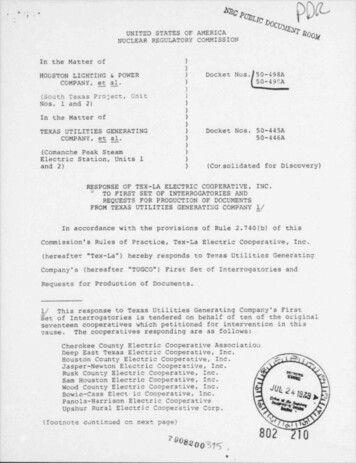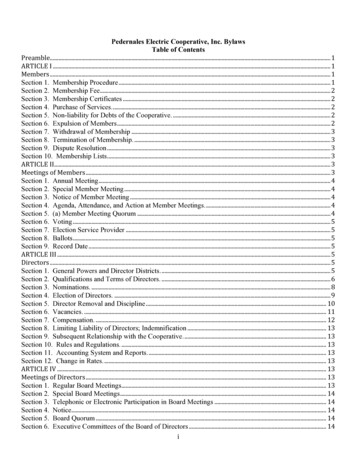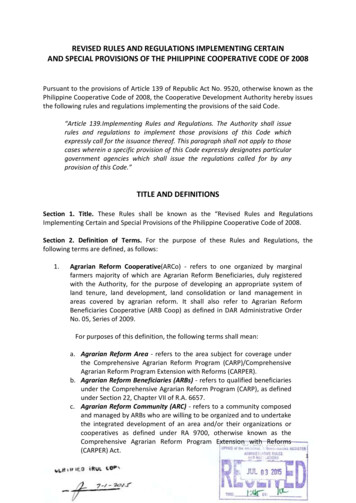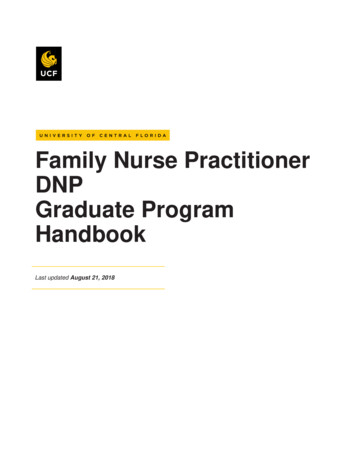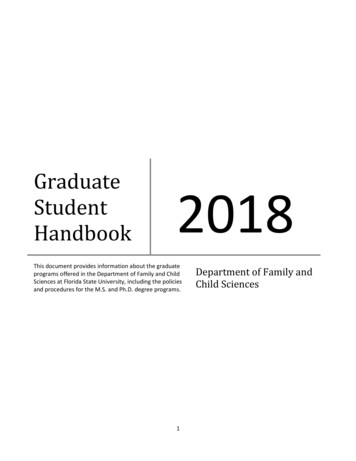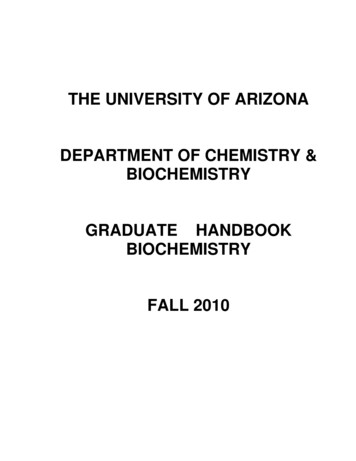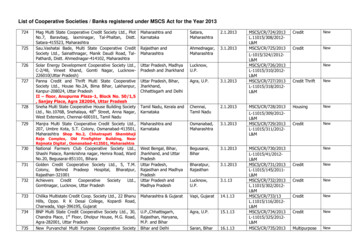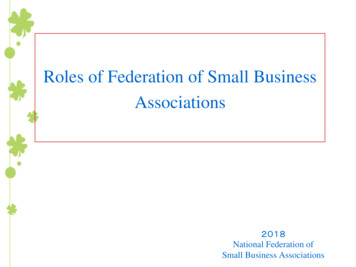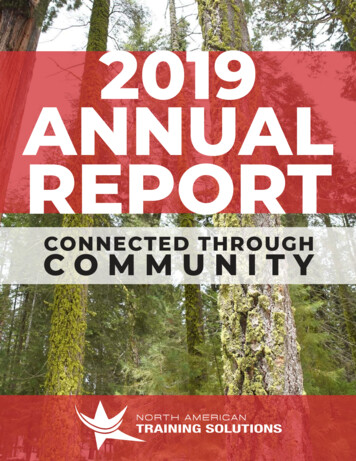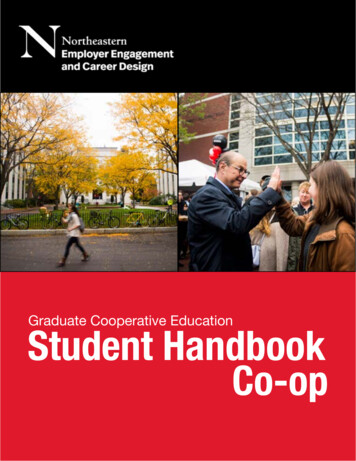
Transcription
Graduate Cooperative EducationStudent HandbookCo-op
ContentsContentsThis guide is designed for students whoare approved to search for co-op.ort ea tern niver it a endeavored toprovide accurate in or ation in t i uideo ever t e in or ation i provided a iit out arrant o an ind ort ea ternniver it doe not accept an re pon i i itor ia i it or t e accurac contentco p etenee a it or re ia i it o t ein or ation contained in t i oo etntroductionCo op c edu eCo op E i i i itCo op reparationrocurin a Co op occeptin a Co opor in on Co opCo p etin a Co opGovern ent o icien or ation or nternationa tudentCo opinroad G o a Co op ro radditiona e ource1
IntroductionThis handbook will help familiarize you with Northeastern’snationally acclaimed cooperative education (“co-op”) program and willserve as a resource for you throughout your graduate co-opexperience(s). You are required to take the time to learn the program’spolicies, procedures, and options. Remember that your co-opcoordinator is always available to help you with questions regardingyour co-op curriculum.What is cooperative educationWho participates in co-op?E periential learning integratesthe classroom and the real world.Cooperative education ( co-op )is one of the fundamentale periential learning programswhere students engage with theworld through professional workand learn how to transform ideasand information across conte ts.Students who participate ingraduate co-op, alternatebetween semesters of academicclassroom work, and semestersof full-time employment in fieldsrelated to their skills andinterests.Co-op is an integral part of aortheastern education and isre uired in some programs.lease consult with your co-opcoordinator to understand allre uirements.Typically, graduate co-ops last months. Start and end datesgenerally correspond with theacademic semester. Students aree pected to return to campus afterco-op.What role does my co-opcoordinator play?What is my role in the co-opprocess?Each student is assigned a co-opcoordinator based on theirprogram. Co-op coordinatorswork with students to (1) identifyand apply for appropriate co-oppositions, (2) developindividualized strategies for theirco-op search, (3) assist studentsThis combination provides anopportunity for students to (1) use if any uestions or concerns arisewhile they are on co-op, and ( )their knowledge and practicetheir skills in an authentic, real-life facilitate learning and reflectionsituation (2) gain new knowledge upon completion of a co-op. Coand develop new skills to engage op coordinators also teach therofessional evelopment for coin unfamiliar tasks and activitiesopcourse that is re uired insuccessful and, (3) integrate anduse both the new and deepened some programs.knowledge to continue to learn intheir academic programs.2o lon are co-opsStudents take ownership of theirco-op application process. hileyour co-op coordinator is a sourceof support throughout, students aree pected to prepare jobdocuments such as resumes andcover letters. In addition to activelyreview and apply to graduate coop postings in and outside of theUniversity job search databaserespond to communications fromco-op coordinators and employerspromptly, and interview for co-oppositions. The more effort a studentputs into the process, the morelikely their co-op search will besuccessful.3
Co-op Schedulemuaranteed a co-op oCo-op is an employmentrelationship between the co-opstudent and the employer.ortheastern cannot guaranteethat you will secure a co-op job.s a result of the job market orother conditions, even awell- ualified student may notobtain a position. orkingclosely with your co-opcoordinator and meeting allre uired deadlines will benefityou in your co-op job searchprocess.ou will also e pand your jobopportunities by considering avariety of geographical locationsand types of positions, includingglobal opportunities. If you areunable to obtain a co-op job,please speak with your co-opcoordinator about other options.our options depend upon yourcollege and academic program.4o much ille paidCompensation is set by theemployer and depends on manyfactors, including the industry,level of the position, and the localeconomy. There are a few unpaidopportunities. If the salary is notposted on the University jobsearch database, your co-opcoordinator may be able to giveyou compensation informationrelating to an opportunity.dditionally, you do not pay tuitionwhile you are on co-op unless youare enrolled in an academiccourse.Where do live hile on co-opSome employers may providehousing and relocation assistance.Off-Campus ousing and SupportServices provides support andeducation related to off-campushousing, relocation services,renter s rights knowledge, andcommunity connection. The officeoffers many resources, specialprograms, and events to help youfind off-campus housing in ostonand beyond, stay connected tocampus, and serve as a link to yourpeers, alumni, and community. Ifgoing on co-op or part of aortheastern program beyondoston, we offer leased housingoptions in popular co-op locations.e also help you understand yourrights and responsibilities as arenter and how to navigate landlordissues. eer Communitymbassadors plan programs andevents for you, are here to answerall of your uestions and help youmeet your neighbors. Call us, emailus or stop in to see us today5
Co-op EligibilityEvery student must meet the followingeligibility requirements in order to participate inco-op. These are general requirements for allstudents; however, students must work closelywith their co-op coordinator and academicadvisor to ensure that they meet any college- ormajor-specific requirements and any majorspecific logistics, deadlines, and requiredpaperwork.General Requirementsefore they can be authorizedto begin the co-op searchprocess, students must: Satisfactorily complete therequirements and deadlines setby Northeastern and theirspecific academic program. Resolve any previousdisciplinary or academicprobation issues eet minimum program Prequirements Comply with any preemployment checks required bythe employer (see page 1 ).6 ave completed oneacademic year at Northeasternprior to your co-op start date. ave completed oneacademic year at Northeasternprior to your co-op start dateEvery student must meet thegeneral eligibility requirementsto participate in graduate coop. owever, students mustwork closely with their co-opcoordinator and academicadvisor to ensure that theymeet any additional college orprogram-specific requirementsand are aware of majorspecific logistics, deadlines,and required paperwork.Policies vary by both programand college. To beginreviewing your eligibility, clickon your college.ouv College ofSciencesealthCollege of ScienceCollege of EngineeringCollege of Social Sciencesand umanitieshoury College of ComputerSciencesCollege of ProfessionalStudiesCollege of rts,Designedia, andD’ more- c im School ofusinessSchool of awn lish ro iciencyEnglish proficiency isrequired for many co-ops.In some programs, T Escores are used to assesseligibility for co-op. Checkwith your co-opcoordinator.ppeals rocessIf your co-op coordinatorhas determined you areineligible to go on co-op,you may appeal to yourcollege s standingcommittee. ( r the directorof cooperative educationfor your college, if yourcollege does not have astanding committee).7
Co-op Preparationrocurin a Co-op JobOnce you have met your program’s requirements, you will be eligible toapply to co-op positions. The application process may vary by academicprogram, your co-op coordinator will advise you of any deadlines forapplication. For information about co-op outside the U.S., please see page22.re arati nurseThe first step in participating inthe graduate co-op program isto complete a course about theco-op search process andgeneral career development.This course is a co-op prere uisite in some (but not allgraduate programs. It teachesjob search skills, includingresume writing and interviewpreparation, that will ma imizeyour chances of getting thebest co-op job for your needsand interests. ou will alsodiscuss professionale pectations in the workplaceand success on co-op. Contactyour department to determinewhether and when to registerfor the course. If your collegedoes not have a re uiredcourse, please review yourprogram's materials todetermine if another form ofpreparation is re uired.8What happens i chan e intoa di erent pro ram?Please let your current co-opcoordinator know if you changeprograms. They can advise youon the best plan movingforward.o do schedule anappointment ith my co-opcoordinator?nce assigned a co-opcoordinator, you can schedulean appointment or view yourco-op coordinator’sappointment calendar in theNortheastern student portal(www.myNortheastern.edu).o do apply or a co-opposition?Once students have mettheir program sre uirements, they will beeligible to apply to co-oppositions. The applicationprocess may vary byacademic program your coop coordinator will adviseyou on any applicationdeadlines. uring thesemester, candidatesinterview for positions, andemployers choose a co-opbased on the skills andre uirements for the job.For information about co-opoutside the U.S., followthese linksWhat isor s?Uworks is ortheastern sonline database of co-opjobs. This system makes iteasy to upload your resumeand search for co-op jobsthat best suit your skills.Once you have beenapproved for co-op, you willbe able to access Uworks.Some highlights of what youcan do with UworksincludeSearch, sort, and selectco-op positions based onyour major, interests, andskills, as well as build apreference list ofpositions that interest you.ost and apply with yourresume, after yourCoordinator hasapproved it.Track your co-opapplications. If you haveany uestions about thedatabase, talk with yourco-op coordinator.ay or outside ooston?Yes Co-op opportunitiesexist around the country andthe globe. To ensure the bestco-op experience possiblestudents are encouraged toconsider co-op opportunitiesoutside of oston andassachusetts. The moreflexible you can be with thelocation of your co-op, thegreater the opportunities willbe.Your co-op coordinator mayalready have establishedcontacts in your preferredregion or can advise you onhow to develop leads in areasof interest. If your interests gobeyond the United States,please see page --- to learnmore about global coopportunities.9
rocurin a Co-op JobPre-Employment ScreeningCo-op employers mayrequire applicants to undergopre-employment screening,such as drug testing, creditchecks, physical examinations, security clearance, andcriminal record checks.o can develop my o nposition?ortheastern has a range ofresources available to helpyou find a graduate co-opposition, including your coop coordinator and theCareer esign staff (pleasesee page ---). eencourage you to use theseresources to find a co-opposition that matches yourvalues, interests,personality, and skills. oumay also choose to make orcall upon your connectionsto find a co-op job. If youfind your own position, keepthe following in mind10Jobs Involving Cannabis/MarijuanaAlthough Cannabis has been legalized both recreationally andmedicinally in some states, it remains illegal under federal law.Northeastern University is a drug-free campus, consistent withfederal law. Northeastern may post co-op positions in the cannabisindustry in those states that have legalized medical and/orrecreational use of cannabis but cautions that the use and/or sale ofmarijuana may be prosecuted by federal law enforcement and thatany such co-ops, research, or job opportunities could potentiallyaffect your federal student loans, immigration status, or futurebackground checks for security clearances. Any student whochooses to engage in such an employment does so at their own risk.iscuss your planswith your co-opcoordinator well inadvance of the co-opperiod.It is your responsibilityto inform the employerthat you are aortheasternUniversity co-opstudent and that youwill return to theUniversity at the end ofyour co-op cycle.Co-op studentscannot be employedas consultants orindependentcontractors.cceptin a o-opaution oocial et or in We sitesStudents should be aware that social networking websites such asacebook, YouTube, Snapchat, Instagram, and inkedIn are public, andemployers can and do review them to learn more about job applicants.Employers may also use search engines such as oogle to learn moreabout applicants. Please keep this in mind when posting personal andprofessional information and photos on these public websites.o do accept a co-opo ?hen you receive an offer,thank the employer and askfor 2-3 business days tomake your decision. It ishighly recommended thatyou meet with your co-opcoordinator during that time.Once you accept a graduateco-op position verbally,electronically, or in writing,you must decline all interviewre uests and inform your coop coordinator of yourdecision.You may NOT accept morethan one job offer. Renegingan accepted offer to work foranother employer may resultin being withdrawn from allco-op opportunities. ouracceptance of a positionalso means that you havecommitted to work for theentire co-op period and thatyou adhere to the datesgiven by your employer andor ortheastern.o do re ister or co-opIn most cases, students whomeet eligibility re uirementsand secure a graduate co-opposition will be registered forthe Cooperative Educationork E perience course onemonth prior to the start of aco-op. There is no charge forthe co-op work e perience.re- mployment creeninCo-op employers may re uireapplicants to undergo preemployment screening, suchas drug testing, credit checks,physical e aminations,security clearance, andcriminal record checks.The course appears on thestudent s degree audit,allowing the student tomaintain full-time studentstatus. Upon completion ofthe co-op and all relevantassignments, grades ofSatisfactory (S),Unsatisfactory (U), andIncomplete (I) are assignedand will appear on youracademic transcript.11
Working on Co-opiscriminationCode of Student ConductNortheastern University does not condone or tolerate any form of discrimination or harassment towardstudents, on the basis of race, color, religion, religious creed, genetics, sex, gender, gender identity,sexual orientation, age, national origin, ancestry, veteran, or disability status, either on or off-campus. sa co-op employee, you are entitled to the same protection of federal and state anti-discrimination lawsas other employees. You may also be protected under Title I due to your student standing within theUniversity.s a graduate co-op student you are anambassador of Northeastern and yourperformance and professionalism will ha e animpact on future co-op hiring. You are e pectedto obser e Northeastern s ode of tudentonduct on the job as well as on campus. lickhere to iew the ode of tudent onductsencesIn general, students cannottake time off from co-op,and vacations are notpermitted. Employersexpect that you will beresponsible and that yourattendance will be regularand punctual. s anemployee, you mustarrange for your personaland college-relatedcommitments to take placeoutside of regular workinghours. If you have militarytraining obligations thatrequire time off from work,notify your co-opcoordinator and yourprospective employerbefore the start of your coop assignment.12Contact your employerimmediately if you must beabsent because of illness oremergency. If the absence isfor a week or more, alsocontact your co-opcoordinator. If you miss workbecause of a work-relatedinjury or illness, be sure toformally report the illness orinjury to the employeraccording to the employer’spolicy and also notify your coop coordinator.arassment and etaliationIf you feel that you are being discriminated against, retaliated against, or harassed, please contact theffice for University Equity and Compliance ( UEC). You may reach UEC at 61 .3 3.4644 or visithttps: www.northeastern.edu ouec . You may also contact your co-op coordinator.a inourses on o-ophene er work and studentacti ity conflict while you are onco-op the needs of yourposition must come first. oumay enroll in a class that takesplace outside of your regularworking hours. owever youshould check with your programand co-op coordinators first orre iew your indi idualprogram s policies. If you areinterested in taking a coursethat interferes with yourco-op work hours you mustpetition and recei e appro alfrom both your co-opcoordinator and your employerbefore accepting your co-opposition. dditionally someprograms re uire a coursewhile on co-op.tayin in ouchWhile you are on co-op, youmay contact your co-opcoordinator for assistance ifany questions or problemsarise related to the co-opcurriculum. Your co-opcoordinator may also reachout to you and your employerwhile you are on co-op. Whilethe co-op coordinator isavailable to assist you withany questions or concernsthat arise while you are on coop related to the co-opcurriculum, the employmentrelationship is between youand the employer. s anemployee, you should reachout to your employer’s umanResources or your supervisorregarding employmentquestions.Laysccasionally, economicconditions may forceemployers to terminate youremployment before the end ofthe co-op term. If you arenotified of a layoff, contactyour co-op coordinator assoon as possible so that theymay work with you to secureanother job or make otherarrangements for thesemester.Wor place ssuess with every other aspect ofexperiential learning, theUniversity and your co-opcoordinator are there tosupport and guide you asnecessary. owever, theemployment relationship isbetween you and youremployer. We encourageyou to make an effort toresolve issues on your ownwith your immediatesupervisor or anothermanager at the job site.Should you feeluncomfortable discussing aproblem with yoursupervisor, ask your co-opcoordinator for assistance oradvice. It is important toaddress issues as they arise,rather than postpone such adiscussion or ignore theproblem.13
Working on Co-opDealing with stressful and uncomfortable situations is part ofthe workplace learning experience. As with every other aspectof experiential learning, the University and your co-op coordinatorare there to support and guide you as necessary. However, theemployment relationship is between you and your employer. Weencourage you to make an effort to resolve issues on your ownwith your immediate supervisor or another manager at the job site.Should you feel uncomfortable discussing a problem with yoursupervisor, ask your co-op coordinator for assistance or advice. Itis important to address issues as they arise, rather than postponesuch a discussion or ignore the problem.ailure to omplete o-op ermination irin or uittinEmployers may terminate a coop employee just as they wouldany other employee. If yoursupervisor has advised you ofperformance issues, pleasecontact your co-op coordinator.Your co-op coordinator will workwith you to offer guidance andadvice. If you are ultimatelyterminated from a co-opposition, contact your co-opcoordinator immediately.There may be extenuatingcircumstances that result in astudent quitting their graduateco-op. If you find yourself in asituation like this, contact yourco-op coordinator immediately.You must make every effort todiscuss your situation with yourco-op coordinator, who willwork with you to develop astrategy for successfulcompletion or a mutuallyagreed-upon separation planecause situations and learningoutcomes vary, consequencesof failing to complete yourgraduate co-op, whether it befrom termination or the choiceto quit the co-op, also vary.Students who fail to complete aco-op position without their coop coordinator’s approval maybe subject to academic ordisciplinary action. These mayinclude, but are not limited to,withdrawal from the Universityfor the co-op term, receiving anunsatisfactory grade for co-op,and or losing future co-opprivileges. Students have theright to appeal grades and coop coordinator decisions totheir college academicstanding committee.Please remember thatgraduate co-op positions havebeen developed for severalreasons, including assistingstudents with their personaland professional development.The co-op coordinators workhard to help identify positionsthat deliver learning outcomesthat lead to lifelong learningand successful professionalcareers. s a Northeastern coop student, you represent notonly yourself but alsoNortheastern University as awhole. Your actions as a co-opstudent impact you as aprofessional, as well as on yourcollege and NortheasternUniversity.
Completing a Co-op JobGovernment PoliciesInternational students are subjectto federal rules and regulationsregarding their ability to legallywork in the U.S. For completeinformation for internationalstudents, please refer to page 18.tudent o-op el ssessmentTowards the end of your co-op,you will be asked to completeand submit a co-op studentself-assessment, which willallow you to assess what youlearned and discuss how yourco-op experience can relate toyour coursework and informyour post-graduate goals. Yoursupervisor will also be asked tocomplete a StudentPerformance Evaluation. eforeyour last day of co-op, studentsare expected to discuss theperformance evaluation withtheir supervisor.In order to receive asatisfactory grade for co-op,you must also complete anyreflective assignmentsrequired by your program.Check your email regularly forprompts and notifications.ettinredit or o-opStudents who fully andsuccessfully participate in coop receive Experientialearning Credit (E C) for eachco-op experience. rades ofSatisfactory (S), Unsatisfactory(U), or Incomplete (I) areassigned and will appear onyour academic transcript.lthough E C is not added tothe academic credit hoursrequired for graduation, yourtranscript will reflect your gradefor each co-op cycle. Your coop coordinator determineswhether you have satisfactorilycompleted the requirements forco-op participation and assignsa grade.Identification/Work EligibilityIncome TaxStudents with DisabilitiesEach time you begin a new jobin the United States, federallaw requires that you verifyboth your work eligibility andyour identity by completing anI- form provided by theemployer.Federal law re uires you tocomplete a - form with youremployer before beginning work.This form ensures that theappropriate federal and stateta es will be deducted from yourwages. If your employer does notdeduct these ta es, you are stillresponsible for paying them.International students arere uired to pay federal and stateta es.If you think you will need areasonable accommodation toapply for a co-op position orperform essential jobfunctions, you should informyour co-op coordinator early inthe co-op application process.our co-op coordinator andthe staff at the isabilityesource Center can answerany uestions you may have.The isability esource Centermay be reached at1 .3 3.2 5.Social Security NumberRequirementll students, includinginternational students, musthave a Social Security numberfrom the U.S. Social Securitydministration, or have apending application for thesame, before working on coop.Working as a Consultant or anIndependent ContractorThe university s e pectation isthat co-op is a supervisededucational e perience. Thus,ortheastern does not grant coop credit for work performed asa consultant or an independentcontractor. Such supervision isinconsistent with consultantindependent contractor status.lease check with your employerat the beginning of your co-op tomake sure that you will bereceiving a 2 form (not a 1099)at the end of the year.17
Information for International Studentss an international student, you are subject to U.S.immigration regulations that govern your employmenteligibility, including co-op employment. Thus, writtenauthorization for each co-op from theS is a federalrequirement prior to engaging in approved co-op positions.This information is applicable as ofthe date of publication, however,circumstances impacting theprivileges and responsibilities offoreign students are without noticesubject to change by U.S.Citizenship and ImmigrationServices (USCIS). This guideline isnot intended as and does notconstitute individual legal advice,but is general and informational innature. Information may be obtainedfrom OGS.Identification/Work EligibilityEach time you begin a new job inthe United States, you must verifyboth your work eligibility and youridentity by completing an I-9 formprovided by the employer. In orderto be eligible to complete an I-9,international students will need toshow the employer both an“International Student Eligibility forCooperative Education EmploymentForm” (OGS Form 153F) and aSEVIS Form I-20 (with an OGS coop authorization on page 3), as wellas provide a Social Security number.Co-op Authorization ProcessThe process for obtaining CPTauthorization begins oncestudents have accepted agraduate co-op and confirmedtheir start end dates. Studentscomplete their CPT applicationusing myS, which, uponsubmission, is forwarded to thestudent’s co-op coordinator orprogram for final review. nceS approves your request, it willissue the student an updatedSE IS ( orm I-2 ) with co-opauthorization, which they mustpresent to their employer. Thisprocess can take up to tenbusiness days, so plan ahead.This document authorizes theterms of the employment with thenamed co-op employer, includingthe location, start date, and enddate of employment authorization.ny changes to the terms ofemployment must be submitted toS immediately.Please note that workingoutside the terms ofauthorized employment isconsidered a seriousviolation of your immigrationstatus and may result in theloss of ability to work orstudy in the U.S. Thisincludes co-op extensionsthat are not previouslyapproved byS.https:international.northeastern.edu ogs l SecurityRequirementll international studentsmust either have a SocialSecurity number or apending application fromthe U.S. Social Securitydministration beforeworking on co-op. henyou first arrive atortheastern, you will bere uired to completeImmigration clearance atOGS and attend mandatorySEVIS and co-opinformation sessions heldduring OGS Orientation, atwhich time staff will adviseyou on the process forobtaining a Social Securitynumber.Income TaxFederal law re uires you tocomplete a - form withyour employer beforebeginning work. If youremployer does not deductta es, you are stillresponsible for payingthem. International students are normally e emptfrom paying Social Securityand FIC ta unless youare considered a residentfor ta purposes, which isbased upon your length oftime in the United States.lso, those students whoare from what are referredto as “Ta Treaty” coun-trieshave additional ta la itybenefits (visit www.irs.govto determine whether yourcountry ualifies).Co-op Employment Outside ofthe United StatesIf you wish to pursue a co-opposition outside of the UnitedStates (in your home country orother country), you will bereferred toS to discuss theamount of time on co-op, re-entryto the U.S., and eligibility for aU.S. co-op upon return. If youseek co-op employment in yourcountry of citizenship or anothercountry in which you haveemployment rights based on birthor lineage, you will have toprovide evidence of obtaining awork permit for that countrybefore applying for graduate coop positions. Each college has adifferent process for approvingglobal co-ops, so check with yourCoordinator to see if they canhelp you with the process.
Working on Co-opctive ilitary utyIf you are in the militaryreserves and are activated forservice while on co-op, youmust contact your programand co-op coordinator toensure the appropriate militaryleave is recorded with theUniversity.20ealthcareull-time students are eligiblefor care at University ealthand Counseling Services(U CS) even when they are onco-op, regardless of theirinsurance. If you are enrolled inthe student health plan, yourcoverage continues during coop. If you have questionsregarding the benefits of thestudent health plan or yourresponsibilities in filing a claim,please contact the studenthealth insurance coordinator at61 .3 3.2.Liability InsuranceThe employer is responsible forgeneral liability andprofessional liability insurance.In clinical settings, where astudent is performing clinicaljob duties, the University has aProfessional iability Policy thatmay provide coverage. Pleaserefer to your co-op coordinatorregarding applicability.21
o-opinroadlobal Co-op Programhe lo al ooperative ducation ro ram providesstudents with an opportunity to explore globalcareer options, develop intercultural and politicalcompetence, and utilize and strengthen foreignlanguage skills.Students should work with their co-op coordinatorto explore existing global opportunities or todevelop their options. Colleges may also havedesignated coordinators who work with studentsseeking global opportunities.Who can participate in globalco-op?Students from all colleges atortheastern are encouragedto participate. ortheasternco-op employees span theglobe and contribute tosolving many of today s mostchallenging problems. Globale periences allowortheastern students to live,learn, and immersethemselves in new cultures.Can I co-op in a country thatis on the U.S. State Department’s Travel Warning List?ortheastern does not allowstudents to travel and work onortheastern Universityaffiliated programs incountries listed on22the U.S. State epartment sTravel arning ist without apetition. Students who areconsidering doing a co-op insuch countries must submit apetition to the InternationalSafety and Securityssessment Committee(ISS C). ISS C will review thepetition and makerecommendations to therovost. The rovost sdecision will be final.What kinds of globalpositions are available?E isting jobs are available ina variety of fields. Studentswork with foreign andmultinational employers, U.S.employers doing business inother countries, and otherinterna-tional organizations.dditional esou
and college. To begin reviewing your eligibility, click on your college. vouv College of ealth Sciences vCollege of Science vCollege of Engineering vCollege of Social Sciences and umanities vhoury College of Computer Sciences vCollege of Professional Studies vCollege of rts, edia, and Design vD'more-cim School of usiness vSchool of aw nlish .
